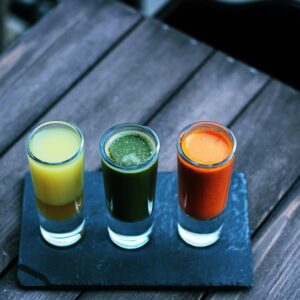Detox diets have become a health trend promising quick weight loss, clearer skin, improved digestion, and even the elimination of toxins from the body. From juice cleanses to fasting protocols and “clean eating” plans, the idea of hitting a reset button on your body is appealing—especially after periods of indulgence. But how much of this is rooted in science, and how much is marketing hype? Let’s break down the truth behind detox diets.
What Are Detox Diets?
Detox diets are eating plans designed to “cleanse” the body by removing toxins, often through periods of fasting, restricted eating, or the consumption of specific foods and drinks such as juices, herbal teas, or supplements. These diets can vary widely in their approach—some last just a day or two, while others go on for several weeks.
Common detox diets might include:
-
Juice cleanses (consuming only fruit and vegetable juices)
-
Water fasting (no food, only water)
-
Elimination diets (cutting out sugar, caffeine, alcohol, and processed foods)
-
Herbal detoxes (teas or supplements claiming to support livers or kidney health)
Proponents of these diets claim they improve energy, boost immunity, aid in digestion, and eliminate harmful substances from the body. But are these benefits backed by science?
The Body’s Natural Detox System
The human body already has a highly effective detox system—your liver, kidneys, lungs, and digestive tract work 24/7 to neutralize and eliminate harmful substances. Your liver, in particular, is a powerhouse for metabolizing toxins, breaking them down so they can be excreted via urine or feces.
There is little evidence to support the idea that detox diets enhance this natural process. In fact, most “toxins” that detox diets claim to remove are vaguely defined, with no scientific backing. Unless someone is suffering from poisoning or organ failure, there is generally no need for external detox methods.
Hydration, a balanced diet, regular exercise, and adequate sleep are far more effective and sustainable for supporting your body’s natural cleansing systems than any extreme detox regimen.
Are Detox Diets Effective for Weight Loss?
Many people report quick weight loss on detox diets—but most of it is temporary. The weight lost is usually due to:
-
Water loss from carbohydrate restriction and dehydration
-
Reduced calorie intake
-
Loss of muscle mass due to insufficient protein
These diets are typically very low in calories and protein, which can lead to fatigue, dizziness, irritability, and nutrient deficiencies. Once normal eating resumes, the lost weight tends to return quickly.
Long-term weight loss comes from sustainable lifestyle changes, not short-term restriction. Balanced eating, strength training, and cardiovascular activity are more effective and safer strategies.
Potential Risks and Side Effects
While a short detox diet may not be harmful for healthy adults, prolonged or extreme versions can pose significant risks. Some of the common side effects include:
-
Nutrient deficiencies, especially in protein, calcium, iron, and essential fatty acids
-
Muscle loss from inadequate calorie intake
-
Digestive issues such as diarrhea or constipation
-
Blood sugar instability, especially in people with diabetes
-
Risk of disordered eating patterns or obsession with “clean” eating
Detox supplements, in particular, can be risky. Some contain unregulated herbs or laxatives that may interfere with medications or cause dehydration and electrolyte imbalances. In rare cases, extreme detox protocols have resulted in serious medical complications.
If you have a medical condition or take medication, consult a healthcare provider before starting any restrictive diet.
A Smarter Approach to Wellness
Instead of relying on restrictive detox diets, focus on supporting your body’s natural detoxification systems every day with these sustainable habits:
-
Eat a balanced diet rich in whole grains, lean proteins, fruits, vegetables, and healthy fats
-
Stay hydrated with plenty of water
-
Limit alcohol, sugar, and highly processed foods
-
Get regular exercise to support circulation and metabolism
-
Sleep well to allow the body to repair and rejuvenate
-
Support gut health by including fiber, probiotics, and fermented foods
If you’re looking for a reset, consider a short-term focus on whole, minimally processed foods rather than a drastic cleanse. This can help you feel better without depriving your body of essential nutrients.
In conclusion, while the appeal of detox diets is understandable, the science behind them is weak. Your body is naturally equipped to detoxify itself, and extreme cleanses can do more harm than good. Instead, prioritize long-term healthy habits over quick fixes—and trust your body to do the rest.






